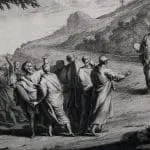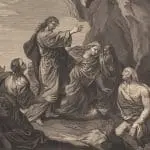[Originally published as the first section of Untwisting Scripture: Refuting Flat Earth Falsehoods – Part 2, written by Jason Churchill]
Previously, we began a series of articles about the so-called flat/stationary-earth prooftexts in the Bible. There is an abundance of vocal flat/stationary proponents (FSIPs) that go around citing a handful of biblical verses, alleging that these verses are proof that the Bible depicts, indicates, or implies a flat and/or stationary world.
In this article, we’ll be looking at four of the most frequently cited passages by FSIPs as “proof” that the Bible indicates a stationary or unmoving earth. If you’ve been around the discussion for any amount of time, you’ll recognize them: Psalms 93:1, 96:10, 104:5, and 1 Chronicles 16:29–30.
The parts of these verses that FSIPs quote are as follows (here in the ESV):
Yes, the world is established; it shall never be moved. (Ps 93:1)
Yes, the world is established; it shall never be moved; (Ps 96:10)
Yes, the world is established; it shall never be moved. (1 Chr 16: 30)
He set the earth on its foundations, so that it should never be moved. (Ps 104:5)
FSIPs allege that, based upon the phrase “never be moved,” these verses clearly and unequivocally tell us that the earth/world is unmoving. That is, it’s stationary, completely motionless, and immobile.
Their belief is that “earth/world” in these passages must mean “the whole physical world,” and that the phrase “never be moved” is referring to physical “Newtonian” motion.
Is this interpretation correct?
Are their assumptions valid, or is this another example of contextomy and quote-mining? Let’s take a brief look.
We’ll begin with the phrase “never be moved.” In Hebrew it’s the verb môṭ’ (in its various grammatical forms1) modified by the adverb bǎl.
The lexical definitions of the verb môṭ’ ( מוט ) are: “to slip, totter, stagger, quake, be shaken, toppled, moved, or removed.”2 The biblical senses of môṭ’ include “to be caused to waver,” “to be caused to be shaken in one’s resolve,” “to be caused to move or shift into a new position or place” (either in a concrete or abstract sense), “to move without being stable, as if threatening to fall.”3
The adverb bǎl (no, not, never) negates the action of môṭ’. Hence, the wording “never be moved.”
This phrase (môṭ’ modified by bǎl) occurs eighteen other times in the OT. Of those, fourteen appear in the Psalms. That many other uses should give us a lot of insight about the phrase, especially the other uses in the Psalms!
So, of those fourteen other uses in the Psalms, how many times is this phrase referring to physical motion?
None.
Yes, you read that right. Not once in these fourteen other occurrences in the Psalms does this phrase relate to physical motion. Rather, every time it appears, it’s used in relation to the condition of the ongoing stability of its subject. In all fourteen occurrences, it’s used as an idiom to convey the concept of an unchanging state of safety or security, communicating the abstract truth that the condition of its subject will not falter.
An idiom is an expression peculiar to a culture or cultures that, when taken as a whole, has a meaning that would not be naturally derived from the conjoined meanings of its individual elements. For example, the meanings of the phrases “beating around the bush” or “under the weather” would not be naturally derived from their individual words. Nonetheless, their meanings are clear in our culture.
In the same way, the Bible contains many idioms like “apple of my eye” (4×), “your right hand” (30×), “at hand” (24×), and “under your feet” (20×). These phrases don’t address literal, physical apples, eyes, hands, or feet. The meanings of the phrases cannot be derived from the conjoined meanings of their individual words.
For instance, the idiom “under your feet” conveys the concept of victory and dominion. Whether it be Israel’s victory over its enemies (Psalms 18:36–38; 47:3), the Lord’s victory over his enemies (Matthew 22:44), believers victory over Satan (Romans 16:20), or Jesus’ final victory and dominion over all things (Ephesians 1:22; 1 Corinthians 15:25, 27), the concept being communicated is not the geographical location of something relative to one’s physiological feet, but the idea of victory and/or dominion.
Likewise, the meaning of the phrase “never be moved” cannot be derived from the conjoined meanings of its individual words.
For instance, Psalms 15:5, 55:22, and 112:6 say, “the righteous will never be moved.” If these verses refer to physical motion, then anyone who is righteous is rendered completely physically immobile. Obviously, physical motion is not what’s being referred to by the phrase “never be moved.” Rather, the meaning of “never be moved” is that the condition of the righteous person is sure: they will not be shaken or fall from their righteous standing before God. As it says in Proverbs 12:3, “The root of the righteous will never be removed” (identical Hebrew phrase).
Psalms 21:7 and 30:6 assure King David that he “shall not be moved.” If we were to take the conjoined meaning of these words at face value, we would end up thinking that David never physically moved again. So, either David became a paraplegic who never moved from his bed once he became king, or this is once again an idiom conveying the security of David’s standing in God.
In Psalms 16:8 and 62:2, 6, David repeats the exact phrase (bǎl ēm· môṭ’). What does he mean? Well, here the phrase is translated, “I shall not be shaken.”4 He’s speaking idiomatically, saying that his condition is secure, that he won’t fall from God’s sustaining grace. His hope in and standing before God is established, firm, sure.
Psalms 46:5 and 125:1 assure the reader that both the city of God and Mt. Zion “shall never be moved.” Is the author trying to convey the concept of physical motion here? No. The parallel term in 125:1 is “abides/endures.” And in Psalm 46 the author contrasts the city of God that (bǎl tim· môṭ’) “shall not be moved” with the other kingdoms that (môṭ’) “totter.” These words are about the enduring stability of these places. They’re established, firm, sure. They will not falter.
All fourteen other uses of this phrase in the Psalms are idiomatic. If these are, then there’s a fair chance that the phrase “never be moved” could be idiomatic in Psalms 93:1, 96:10, and/or 104:5 as well. But that doesn’t necessarily mean that they are. So, let’s look at these three occasions.
Is the use of the phrase “never be moved” in these Psalms different, intended to describe, depict, or otherwise concretely indicate that the whole world is unmoving? Or are they also intended to be idiomatic expressions?
Let’s first look at what these passages have in common before examining each of them in their particular literary contexts.
- All of these verses are poetic.5 Hebrew poetry, like all poetry, is a type of stylized literature that incorporates symbolic and/or figurative language to communicate abstract concepts, ideas, or truths.
- All three passages appear in book IV of Psalms (Ps 90–106), which focuses on God as king and the world under His sovereign reign.
- Each of these passages incorporates a descriptive phrase about the “world/earth.”
the world is… it shall… (Ps 93:1; Ps 96:10 cf. 1 Chron 16:30)
He set the earth on… so that it should… (Ps 104:5) - Each also incorporates the phrase “never be moved,” in reference to the world/earth.
Let’s now look at each of the passages to ascertain their meanings.
Psalm 93:1–2
The Lord reigns; he is robed in majesty;
the Lord is robed; he has put on strength as his belt.
Yes, the world is established; it shall never be moved.
Your throne is established from of old;
you are from everlasting.
First of all, we need to understand the context of the psalm itself. What was the overall purpose for its being written? Psalm 93 is a psalm about God’s sovereign dominion over the world, as the opening line extols, “The Lord reigns.”
As commentator Tremper Longman III summarizes the psalm like this, “The psalmist proclaims God as King of the world. He is not proclaiming him as King for the first time. Far from it. He has been King from all eternity. There never was a time when God was not sovereign ruler of the universe. Human kings are dressed in fine ornamental clothing, but God’s robes are his majesty. Human kings carry ornamental maces called scepters and go to battle using sword and spear, but God’s weapon is his strength. As a result of God’s kingship, the world is stable (established, firm and secure).”6
The purpose of this psalm is to declare the surety of the Lord’s sovereign rule over the world, and the resultant stability of the world He rules. With this backdrop established, we can now ask, “What does ‘the world is established; it shall never be moved’ mean within this context?” Is it indeed indicating or inferring that the tangible world is physically stationary as FSIPs suggest? Or do these words communicate a different idea?
Well, we have a wonderful advantage for understanding this passage since it’s Hebrew poetry. Hebrew poetry is formed by parallelism, and so, all we need to do is identify the type of parallelism the author is using and then determine the parallel phrase in order to grasp the psalmist’s intended meaning.
Here the psalmist is using synonymous parallelism.
…the world is established;
…it shall never be moved.
The phrase “is established” corresponds with, and is therefore meant to be analogous to, “shall never be moved.”
As Jason Lisle says, “Since the passage (like all of the psalms) is poetic, the two parallel phrases must be interpreted as a unit. Any alternative will not arrive at the meaning of the passage — the author’s intention. Thus, the phrase ‘established’ must be directly comparable to ‘cannot be moved.’”7
The Hebrew word here translated as established is kûn and is variously defined as: “established,” “stable,” “securely determined,” “sure,” “sustained,” “founded,” “made firm,” “readied,” “steadfast,” and “appointed.”
What is the author’s intended meaning of “established” here? Well, he further helps our interpretation by repeating the same word in the very next stanza.
“Your throne is established [kûn] from of old; you are from everlasting.”
Now, if we’re to consistently follow the FSIPs’ “literal,” concrete reasoning here, our understanding of this stanza would be that God’s material throne doesn’t change physical locations; He’s stayed in the same geographical location forever.
Dare I say that most FSIPs would never interpret this stanza like that because it’s simply ridiculous? We all recognize that this stanza is utilizing figurative language to convey abstract concepts.
In this stanza, God’s throne, a metaphor for His sovereign rule, is established from “of old,” from eternity past. The clear meaning is that the Lord’s kingship is definite, determined, settled securely and unconditionally from forever to forever.
The word established in v.2 is communicating the abstract concept of stability and surety, of being securely determined. In like manner, the world is also established.
As J.A. Motyer notes, “Vs 1–2 work downwards from the securely enthroned Lord to the derivative security of the world he rules.” 8
Remember, the entirety of the psalm is about the sovereign dominion, the reign of God. The psalmist is talking about the condition of the world in relation to the Lord’s reign. Just as God’s sovereign rule has remained stable, it has never faltered, nor ever will, so too the earth under that rule. His sovereign will will be done.
As Lloyd Ogilvie says, “The earth, however, has no autonomous existence. It is established because God is established.”9
You’ll also notice that the psalmist’s use of the term “world” here means much more than just the physical planet. This psalm is about the earthly realm; the world’s governments and their affairs, its armies and their conflicts, its peoples and their problems, its events and their consequences.
Commentator Allen P. Ross remarks, “By His rule the whole world will be firmly established (cf. 96:10). This means that all the moral and legal orders of life will be solidified under His dominion. Since His throne was established in eternity past, His reign on earth is solidly insured.”10
The psalmist’s intent here is to proclaim the Lord’s universal reign over all creation and its activities, not to tell us that the physical world is a stationary mass fixed in place.
In other words, the course of this world “will not deviate from the path that God has created for it, just as David says he will not deviate from his spiritual path,” writes Jason Lisle. “The Psalmist is not talking about motion, but rather about stability.”11
The phrases “is established” and “shall never be moved” communicate the concept of ongoing stability.
Dr. Lisle comments, “[This] indicates the ongoing and passive result of God’s action of establishing the world. In other words, because of God’s sovereign sustenance of the world, as its controller, the world has an ongoing stability that He continues to provide. The action verb here has the idea of becoming or being stable — to be firm, fixed, stable, secure, or established.”12
The earth and all its governments, people, and events are established by, sustained by, and will never be moved from under God’s reign. Lloyd Ogilvie summarizes these two verses, “Thus, the world is established in the eternal God. He reigns as King (v. 1) and manifests this reign through His faithful preservation of this planet and His powerful interventions in our lives.”13
The meaning of “shall never be moved” in Psalm 93 is clear and is the same as the other fourteen places in the Psalms that we’ve looked at. It’s an idiom for ongoing stability. There isn’t even the slightest hint of physical motion being indicated nor inferred in this passage.
As Richard D. Phillips says, “The point of this statement is not that the earth is fixed in space, with the sun orbiting around it, as some early medieval scholars claimed. The emphasis is moral and decretal, not scientific or astronomical. God’s order and righteousness cannot be overthrown, despite the presumptions of earthly governments that seek to replace God’s law with perverse demands. God’s will for the world is unshakable and fixed.”14
Footnotes
- The various grammatical forms of môṭ’ include yim· môṭ’ (3rd prsn., sing., male), tim· môṭ’ (3rd prsn., sing., fem.), ēm· môṭ’ (1st prsn., sing.), na· môṭ’ (3rd prsn., pl.).
- Swanson, J. A. 1997. Dictionary of Biblical Languages with Semantic Domains: Hebrew (OT). Faithlife.
- Hoogendyk, I. 2017. Lexham Analytical Lexicon of the Hebrew Bible. Bellingham, WA: Lexham Press.
- ESV, NIV, NLT, NASB
- Yes, the book of First Chronicles is historical narrative, yet this passage is the record of a song of thanksgiving that is also recorded in Psalm 96. The two passages are the same.
- Longman, T. III. 2014. Psalms: An Introduction and Commentary (Tyndale Old Testament Commentaries Volumes 15–16) (D. G. Firth, Ed., p. 334). Nottingham, England: Inter-Varsity Press.
- Lisle, J. 2015. Understanding Genesis: How to Analyze, Interpret, and Defend Scripture (p. 198). Green Forest, AR: Master Books.
- Wenham, G. J., et al. 1994. New Bible Commentary, 21st Century Edition (p. 547). Leicester, England: InterVarsity Press.
- Williams, D. 1989. The Preacher’s Commentary – Vol. 14: Psalms 73–150 (L. J. Ogilvie, Ed., p. 171). Nashville: Thomas Nelson Inc.
- Walvoord, J. F. and R. B. Zuck. 1985. The Bible Knowledge Commentary (Old Testament) (p. 861). Wheaton, IL: Victor Books.
- Lisle, 199.
- Lisle, 198.
- Williams, D. 1989. The Preacher’s Commentary – Vol. 14: Psalms 73–150 (L. J. Ogilvie, Ed., p. 171). Nashville: Thomas Nelson Inc.
- Phillips, R. D. 2020. Psalms 73–106 (Reformed Expository Commentary) (p. 306). Phillipsburg, NJ: P & R Publishing.







